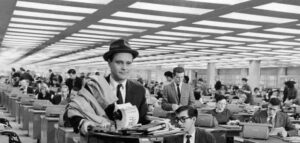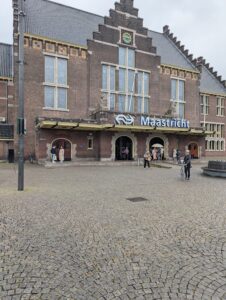 Many people believe Europe is miles behind America when it comes to new technology. Europeans I have spoken with agree. (To light a candle at the Basilica press your phone to this terminal.)
Many people believe Europe is miles behind America when it comes to new technology. Europeans I have spoken with agree. (To light a candle at the Basilica press your phone to this terminal.)
But one area where they’re not behind is in adapting to technology. I realized how far this has gone when my phone service went out on the way back from Maastricht. I’ll get to that soon.
I have noticed since coming to the Netherlands how the country is entirely dependent on smartphones and debit cards. Even a transaction of a few Euros is done with a debit card, called a pinpass here. You tap the card against a handheld reader and look for the check mark, done.
This has eliminated a lot of jobs. There’s now just one check-out at the Albert Hejin grocery. Everything else is self-scanning. After you finish you get a “short” ticket with a bar code and press it against a pedestal to get out. No one gives it a second thought.
The train system no longer has ticket booths. It does have kiosks that sell tickets, but there’s a surcharge on them. The preferred method is to register your debit card number with an app called OV Pay, then press the back of the phone to a reader when you enter or leave the station – “in checken” and “uit checken.” The system records the ride and debits your card before you reach the street. The train schedules are also all on an app.
It’s that way all over. Many stores here no longer take cash. It’s all debit card. Note, not credit card. Debit card. And it’s always through the “air,” no mag stripe slots or chip readers. It’s fast. So fast.
Contrast With The USA

The difference is that, if you’re using a debit card, you’re inputting your four-digit PIN to complete the transaction. You don’t do that with the credit card. The name “pinpass” has become a misnomer in Europe. What’s your credit card PIN? I don’t know mine, either.
The easy use of credit cards leads to big profits for processors. That’s because a credit card is a loan. You borrowed that meal. You’ll pay for it after a month. Guess who has that cash in the meantime? That’s not true for debit cards. The money comes right out of the account, bang. Check your bank after you buy that King Day hat in Amsterdam, the money is gone.
Anyway…

It had been a great day. I had a good interview and visited the Basilica of St. Servatius. I had a great German meal at the Brasserie Monopole. Maastricht is in the “panhandle” between Belgium and Germany, and it’s about the size of Maryland.
I checked in with my phone and hopped on a train that was waiting for me. We had just gotten past Eindhoven, on the way to Utrecht, when my Google Fi connection disappeared. The phone didn’t go out, just the connection.
The trouble was that my train ticket was in there. OV Pay was there and so was my debit card. I hadn’t seen a conductor but one might come through any moment, holding their phone to my phone, waiting for the telltale ping showing I was good for the ride. What if I couldn’t “uit checken” at the end of it?
New Android phones don’t restart at the press of a button. After trying to tear apart the phone’s cover, and failing, I found a “repair” mode. Which, once complete, wanted me to input my password to get back on Google. Which, of course, was locked inside the phone. I had to go through the process of scanning my fingerprint, and my face, before my phone trusted me with the Internet.
This took about 20 minutes. It seemed to take hours. I was back online just a few miles outside Utrecht. I’d had quite a scare.
The Lesson

A lot of jobs have disappeared in the rush to phones and debit cards. But there’s still a labor shortage in the Netherlands. There are signs advertising jobs on every corner. Good paying, physical jobs. Not clerk jobs. That bottom rung on the ladder is gone. (The sign reads, “Done with school? We have work for you.”)
The Dutch are efficient. In some ways, the Dutch are ahead of us.









